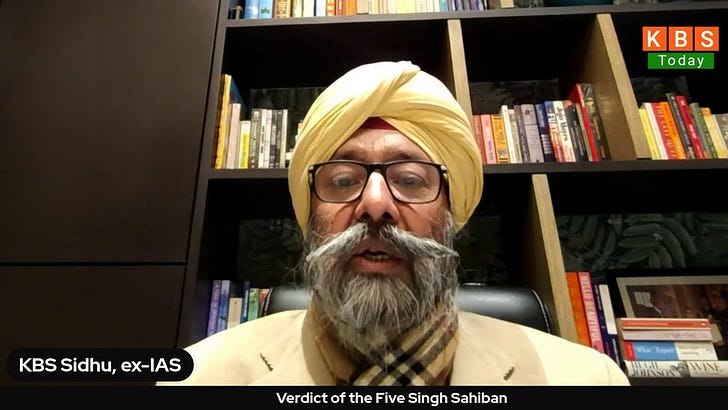On December 2, 2024, the Akal Takht, the supreme temporal seat of the Sikh community, delivered a historic verdict addressing allegations of religious misconduct by the leadership of the Shiromani Akali Dal (SAD) during its tenure from 2007 to 2017. This decision primarily focused on Sukhbir Singh Badal, the SAD President, and several senior party members.
Key Decisions of the Akal Takht
Sukhbir Singh Badal Declared 'Tankhaiya'
Guilty of Religious Misconduct: Sukhbir Singh Badal was declared 'tankhaiya' (a guilty party in religious terms).
Punishments:
Serve as a ‘sewadar’ (volunteer) at various Gurdwaras.
Service at the Golden Temple:
Clean utensils, shoes, and restrooms.
Listen to kirtan for one hour daily.
Wear a placard outside the Golden Temple acknowledging his guilt.
Donate ₹11,000 each to the hundi (donation box) and golak (charity box).
Plant and maintain 1.5 lakh saplings.
Revocation of Parkash Singh Badal’s Honorary Title
The honorary title ‘Fakhr-e-Qaum’ (Pride of the Nation) awarded to former Chief Minister Parkash Singh Badal was posthumously revoked.
SAD Leadership Reforms
Resignation Accepted: Sukhbir Singh Badal's resignation as SAD president was accepted.
Election Mandate: The SAD working committee was instructed to organize elections for the post of president and other office-bearers within six months.
Punishment for Other SAD Leaders
Similar disciplinary actions were imposed on other senior SAD leaders, including Sukhdev Singh Dhindsa, Sucha Singh Langah, Hira Singh Gabria, and Balwinder Singh Bhundar.
Specific tasks included cleaning restrooms, serving food in the Langar, and participating in spiritual recitations.
Reasons Behind the Verdict
The Akal Takht outlined several critical reasons for these actions:
Pardoning of Dera Sacha Sauda Chief: The controversial pardon of Gurmeet Ram Rahim Singh in a blasphemy case in 2007.
Neglect of Sikh Interests: Mishandling key Sikh issues during the Akali government's tenure.
Sacrilege Cases: Poor handling of incidents of sacrilege and protests that followed.
Misuse of Religious Donations: Allegations of diverting funds from religious donation boxes for political purposes.
Impact and Significance
This landmark decision has sent ripples through Punjab’s political and religious landscape, representing a turning point for the SAD, one of Punjab’s oldest political parties. Key implications include:
Restoration of Sikh Values: The verdict underscores the Akal Takht's role in ensuring spiritual accountability among political leaders.
Reforms and Restitution: With measures like reforestation and financial donations, the decision aims at broader community restoration.
Political Repercussions: The SAD faces a critical juncture as it navigates internal restructuring and public trust restoration.
The Akal Takht’s ruling has sparked widespread debate on the accountability of political leaders to uphold Sikh principles, marking a pivotal moment for Punjab’s political future and religious integrity.




Expecting political leaders to work for Panth makes no sense. They have to stay in power to contribute to the panth. They can't get power with only Sikh votes, even if 100% Sikhs vote for them. Akal Takht and SGPC looks at only Sikhs, while to get power the politicians can't work exclusively for Sikhs, and they have never, they will never. Interests of Akal Takht and SAD do not seem to be converging. In pursuit of political significance, Akal Takht and SGPC are losing out on the religious grounds too. With the changing times, the clergy should relook at its constitution, objectives, operating model, scope, mission, before it becomes completely irrelevant.